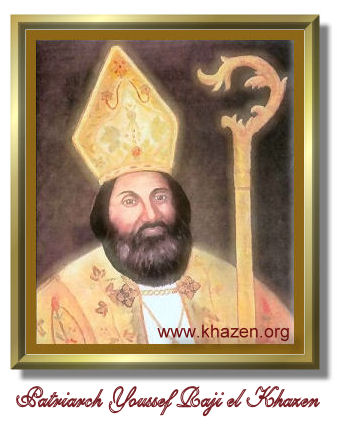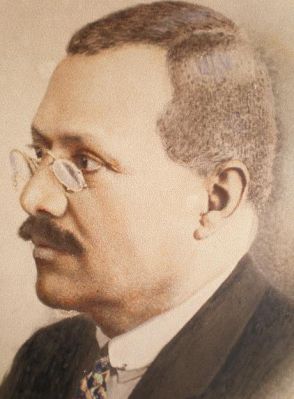Date of Birth: July 1879 in Faraya. Husband of Juliette Louis El Khazen and Father of 4 children: Amin – Lily – Nayla – Ghassan. Positions occupied during the Ottoman Reign: – Director of Zouk (district Kesrouan) July 2nd 1898. – Director of Bikfaya April 3rd 1902. – Director of Zouk December 15th 1902. […]
A letter from Patriarch Mar Nasrallah Boutros Sfeir to the family of Cheikh Serhal el Khazen. Maronite Patriarchate of Antioch and all the East Bkerke This Apostolic blessing is addressed to the beloved ones hereby mentioned: Cheikha Nomiss, sister of deceased Cheikh Serhal Toufic el Khazen and her daughter, her cousins, […]
Cheikh Bechara Jaffal el Khazen of Zouk Mikael is the son of Jaffal, son of Moussa son of Tarabieh, son of Abi Nawfal Nader, son of Abi Nader Khazen, son of Abi Saker Ibrahim who’s the son of Chidiac Sarkis el Khazen. Born in 1756, he held the position of Governor of the […]
Important events during Patriarch Youssef Raji El Khazen’s reign Part1/3 1- During Patriarch Youssef Raji El Khazen’s rule, few priests were performing confessions outside the Lord’s house, thereby violating the church rules. Those forbidden practices were spotted by the Vatican, forcing them to issue a bulletin signed by the Pope Pius IX, […]

Biography
Patriarch Youssef El Khazen is the son of Abi Raji son of Younes son of Abi Sleiman son of Nader son of Khazen son of Ibrahim son of El Chidiac Sarkis El Khazen. Chidiac Sarkis El Khazen moved with his children from the town of Jaj to Bouar in Keserwan in 1545
Patriarch Youssef Raji El Khazen was still in school when he started his ecclesiastical career. He was a man truly devoted to God and was endorsed and blessed as a priest on the 6th of November in 1814 after receiving various previous honors. It was Bishop Youssef Khairallah Estephan who blessed his promotion to priest.
On the 6th of April 1830, he was named Damascus Bishop by Patriarch Youssef Hobeiche the great.
Patriarch Youssef Raji El Khazen was originally from Ajaltoun and followed his studies at the renowned and famous Ain Waraka school.
Maronite Patriarch
After the death of Patriarch Hobeiche, a general Maronite assembly was requested to vote for a new patriarch and took place 9 days after his death on the 16th of May 1845. This delay is mainly explained by the bad security situation in Lebanon due to wars back then.
Here is a list of the attendees at St.Maroun Church at the Maronite Patriarchal seat in the North.
Antoine El Khazen Bishop of Baalbeck
Youssef Raji El Khazen Bishop of Damascus
Semaan Zouein Bishop of Tyr
Abdallah Boustani Bishop of Sidon
Boulos Moussa Bishop of Tripoli
Youssef Rizk Bishop of Kawrach
Philippe Hobeiche Bishop of Hamah
Boulos Massaad Bishop of Tartou
Toubia Aoun Bishop of Beirut
Youssef Geagea Bishop of Cyprus
There were also two priests present, Youssef el Mareed and Boutros Mansour, in charge of keeping record of the elections and any incident reported.
The outcome of this assembly was voting for Youssef Raji El Khazen as the new Maronite Patriarch of Antioch.
Stories that followed Youssef Raji El Khazen’s election
Many rumors spread prior to Raji el Khazen’s election that election were a fraud and protested by many bishops and groups, however the Pope confirmed that Patriarch Youssef Raji El Khazen’s was genuinely elected and gave him the apostolic blessing.
One of the stories that were spread is found in Bishop Youssef el Debs book on Maronites’ history. He narrates that Bishops met in Our Lady of Mayfouk monastery after Patriarch Hobeiche’s death and voted for Bishop Youssef Raji El Khazen as the new patriarch and headed to the North patriarchal seat to confirm and celebrate the election. However Bcharreh residents regrouped and protested against the new Patriarch as they wanted Bishop BoulosMassaad to win and doubted the outcome of the elections.
Another different and more accurate interpretation of Youssef Raji’s election is found in Priest Mikhail Gabriel al Chebabi’s testimony:
“After Patriarch Youssef Hobeiche had died at the patriarchal residence North of Lebanon, all bishops agreed to hold a general assembly. They first called on all Bishops to come to the North for the voting, however many were worried that elections might not be held properly and the freedom of voting might be compromised by the place and time specially that Lebanon was in times of war. This led to the interference of French consul in Beirut who sent his personal associate to guarantee the adequate circumstances for holding the elections. After convincing all bishops to attend, Bishops from Keserwan were the first who headed to the St.John Maroun monastery in Diman. Being mostly from El Khazen noble family, locals in Bcharreh first sought Knights from the Khazen family came to impose their candidate for the new patriarchal seat, before the French consul intervened once again to ensure the legitimacy of the elections. Elections took place and Youssef Raji El Khazen was voted as the new Maronite Patriarch of Antioch. In an attempt to protest this outcome, certain groups tried to protest and make a scene before Sheikh Boutros Karam and French consul’s messenger calmed them down and advised them otherwise.
Patriarch Youssef Raji El Khazen was elected on the 18th of August 1845 as the new Maronite Patriarch of Antioch and he resided in Our Lady of Bechara in Zouk Mikael, Keserwan. Upon his election, he dispatched a letter to Rome through his messenger Nicolas Mrad asking for the papal blessing. Few days later, he received a letter from his beatitude Pope Gregory XVI blessing his victory and confirming the elections.
Cheikh Hanna El Khazen was a famous doctor, born in 1877 that has spent his life improving Lebanese medical connections around the world, hold various top medical and mportant positions in the Lebanese government. He was the second person receiving a medical doctorate from the French Medical Faculty in Beirut. He has has helped and treated the poor at his own expenses. He was very highly regarded in Lebanon and throughout the world. Please click read more to read a unique article that was posted in the magazine "7 Jours de Beyrouth" on the 10th October of 1958.




